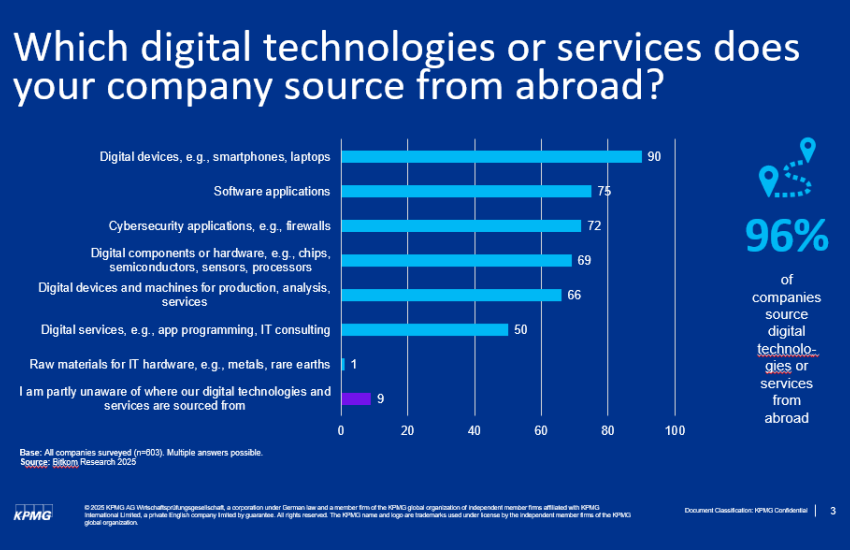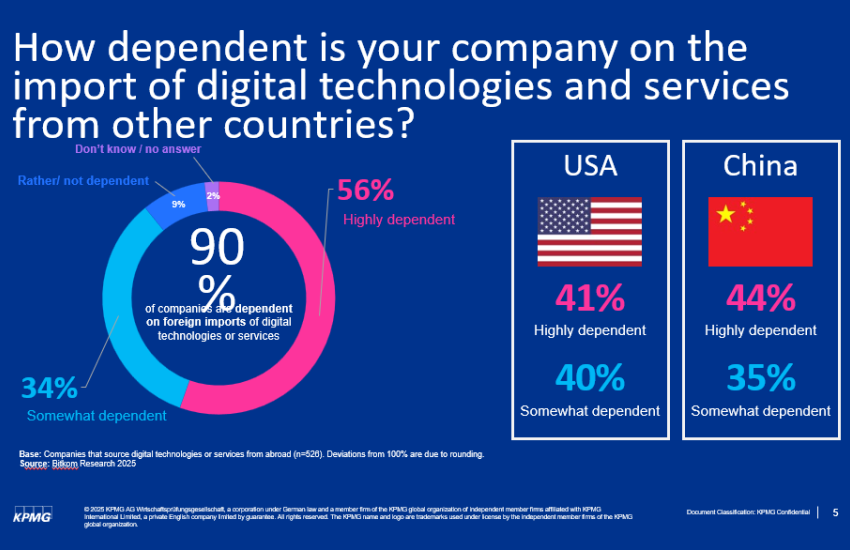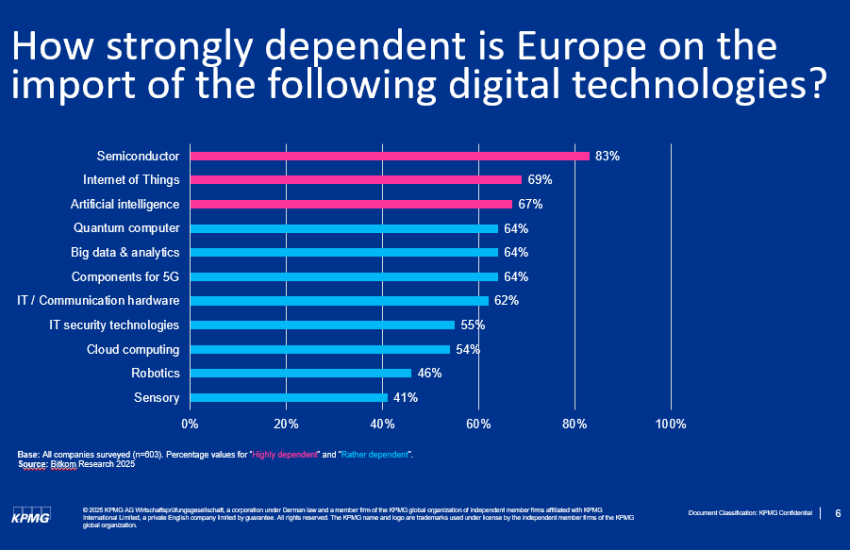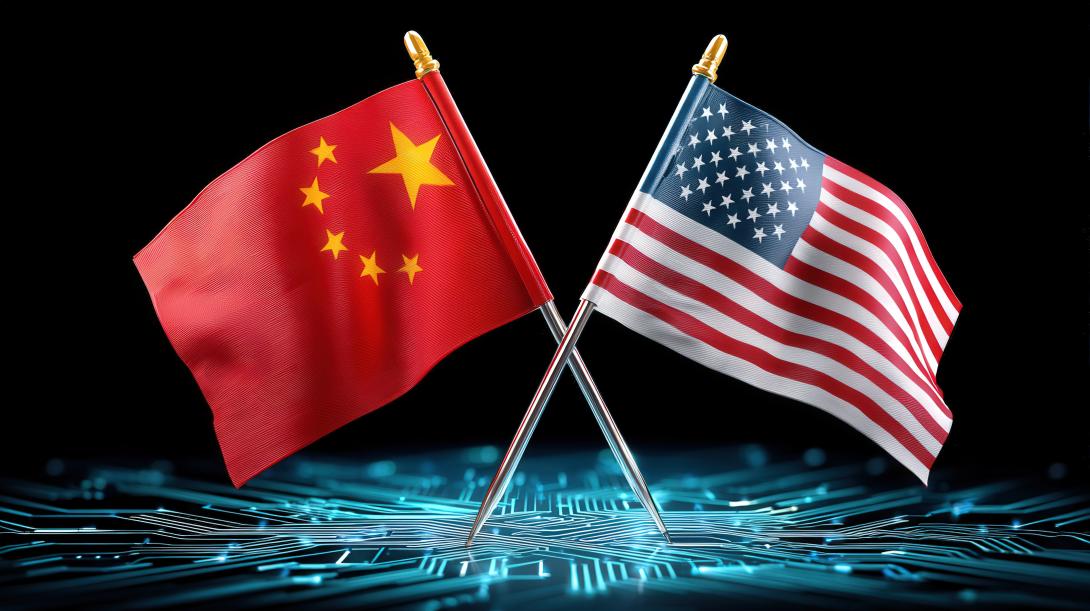European Defense Should Work Toward Digital Sovereignty, Consultant Advises
In a presentation at TechNet International in Brussels, Stefan Hefter spoke on the urgency for digital sovereignty in European defense.
Hefter, who is partner at KPMG Germany, was also a speaker at last year’s event and discussed the high risks of extreme trust in technology. KPMG is a network of professional firms operating in 146 countries and territories. In Germany, it is a leading auditing and advisory firm, according to the firm's LinkedIn page.
“Of course, no dark picture without solutions and without some light at the horizon to show,” he began before reading the definition of sovereignty. “It’s about the supreme power authority held by an entity."
The definition is especially true in digital matters and has become even more relevant today, Hefter stated. He went on to share statistics from a study conducted in Germany, beginning with the percentage of digital technologies or services industry sources from abroad.

China has remained a consistent problem, Hefter stated, referring to previous incidents with built-in wiretaps and 5G equipment. Geopolitical tensions with the United States have also been a cause for concern, he said, while also sharing his skepticism over Taiwanese supply chains.
“There is really a problem that we source a sizeable number of technology from countries that are no longer 100% reliable,” Hefter stated.

He proceeded with a slide that showcased industry’s dependence on the import of digital technology. According to a 2025 survey done by Bitkom Research, the study found that 56% of companies categorize themselves as highly dependent on the import of digital technologies and services from other countries.

Finally, Hefter pointed to Europe’s dependence on the import of specific technologies such as semiconductors and Internet of Things, or IoTs, and artificial intelligence capabilities.

The studies conclude that industry is dependent on foreign technology that is not within the European Union’s control. “The next question is, can we change that easily? Can we change that soon?” Hefter asked. “My take is, in a straightforward way, no.”
Hefter then showed the annual difference between the EU’s investment in research and development—€12 billion by the Horizon Europe program and €1 billion by the European Defense Fund—versus the amount spent by large corporations. Cisco’s research and development investment totaled €8.7 billion, with Apple close behind at €8.5 billion. Additionally, the slide showed Samsung’s yearly spending at €5.6 billion and Palo Alto Networks at €2 billion.
“There’s no way to win that race. They have such a tremendous advantage,” Hefter said of the large industry companies. “They put so much money into [research and development], we can’t really hope to get up to them to get the same level of technology. And I’m not talking about the very, very fancy stuff … I’m talking about basic digital technology, network equipment, mobile devices and so on, the very things that keeps our IT [information technology] operations alive and that are needed in everyday operations.”
While Hefter said he believes the race is lost, he shared his hope for countering the issue by drawing on previous real-life case studies.
- Private cloud
Through entirely open-source information, Hefter’s company built a comprehensive cloud solution. “We own the architecture, it’s completely in our control, we are completely sovereign,” he said. “There’s some hope, with all the technology that’s out there that’s in the public domain there, probably we can achieve sovereignty over cloud and also with private cloud solutions. I think there’s a way to go to really be sovereign and to be independent from the hyperscalers,” he said, referring to large-scale data centers.
- Long-distance network for the German armed forces
“When the German armed forces did their large outsourcing program, they wanted to rebuild the long-distance network with sovereign technology,” Hefter described. The numbers—6,000 kilometers of fiber-optic cables, 50 tier-one locations, 1,200 secondary locations, 200,000 users—made up for a very large network, he said. “In the end, it was proven mathematically that it was not possible to realize that with pure national technology.”
The second attempt was to leverage U.S. network technology, as “you can’t beat it in their performance” while encrypting file storage, emails and public infrastructure. “This architecture is owned by the German armed forces, and they injected cleverly some national cryptographic technology;” therefore, sovereignty was enforced.
- Need for clever architecture
In 2013, Edward Snowden leaked information about the U.S. eavesdropping on German government communication, the presentation slide read.
“Then there was a large push to have secure mobile communication and all attempts before failed,” Hefter explained. Devices were expensive, quickly outdated and were not user-friendly. “And then the working solution was use commercial devices produced by Samsung” to leverage cryptography and a national crypto card to own the architecture.
- F-35
The F-35 program had used a readiness system called Autonomic Information Logistics System, or ALIS, which was later rebranded as Operational Data Integrated Network, or ODIN. This was not the problem, Hefter stated. The emissions data levels, however, provide maps and charts, which the F-35 uses to conduct its missions. “That is exclusively done in the U.S. It’s even stated that this is limited to the U.S., and that is a real brilliant example there. Europe can’t get into the architecture of the whole system because critical components [are] in the U.S.,” he said.
Hefter stated that the race with big technology companies has already been lost due to their advantage of more financial resources. “We can’t hope to step up to them,” he added.
Finally, the KPMG consultant stressed the importance of controlling solution architectures and inserting national key components, which would result in sovereignty “if we act cleverly.”
TechNet International is organized by AFCEA Europe, AFCEA International's European office. SIGNAL Media is the official media of AFCEA International.






Comments